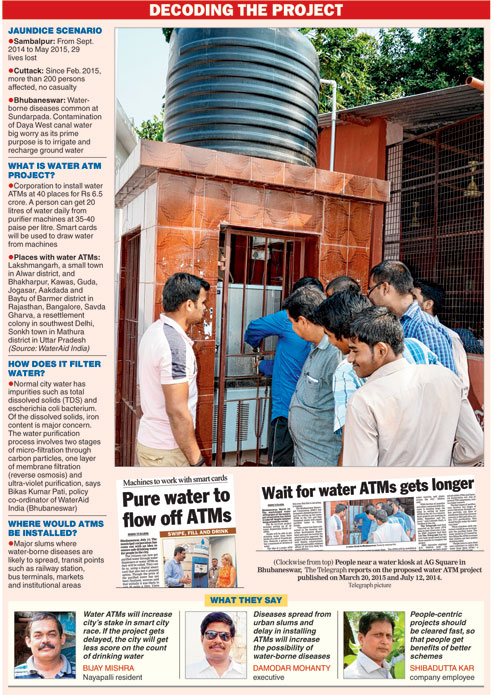Bhubaneswar, July 8: The fight against water-borne diseases continues to suffer a setback with the municipal corporation yet to install water purifier machines for the lack of administrative approval of the state government.
Almost one year has elapsed since the Bhubaneswar Municipal Corporation had decided to install automated teller machines (ATM) across the city to provide purified water to residents.
Besides, with the threat of jaundice now looming large over the state, questions are being raised over the corporation's dillydally to ensure clean and purified drinking water to the residents.
The civic body had made the proposal of installing water ATMs in July last year.
Sources in the civic body said: "The project report has been submitted to the state government, as administrative approval is a must from the housing and urban development department for any work worth more than Rs 50 lakh. We are yet to get the nod and thus the delay. Once the approval is through, the work can start. The project would need Rs 6.5 crore or more."
On this, housing and urban development secretary G. Mathivathanam said: "With certain references to the project report, we have asked for re-cast and re-submission of the proposal on the water ATMs. We have also asked them to follow the norms for procurement of goods as laid down by the state government. They had a presentation last week, but some more changes were needed, and once all are incorporated, we will allow them to go ahead."
The senior administrative official said: "Water ATM is an important project for the city, and we are happy that the civic body is going to implement it. Once they submit the re-drafted proposal and it is through, the project will be implemented with immediate effect."
Earlier, the corporation had planned to provide drinking water through these machines at least by summer this year. But the civic body missed the deadline.
Krushna Prasad Sethi, former councillor of Sundarpada, which has complains about ground water pollution every year, said: "We badly require the machines as contamination of the nearby Daya West canal water is polluting ground water in our area."
"Our locality remains the prime sufferer because of the contamination of the nearby Daya West canal ground water. In fact, the canal was constructed to irrigate and recharge ground water of the areas on the city outskirts, but water contamination has ruined the sole purpose of it," he said.
Sethi admitted that the Khandagiri-Bhimatangi pipe-line had solved the drinking water problem to some extent in the locality. But, the traditional wells and tube-wells were now losing their purpose because of pollution of the ground water.
"Local residents badly require an alternative such as the water ATM to ensure ultra pure drinking water, and the civic body should consider the project urgently," he said.
In principle, the civic authorities have proposed to include all major slums of the city, important passenger transit points and institutions in the water ATM project having drawn a list of 40.
"The ATMs will ensure that the water is purer than that available at home using ordinary water purifiers. The ATMs will be installed at important localities, including remote areas facing water scarcity, and slums across the city," deputy commissioner (projects) and public relations officer of the civic body Srimanta Mishra had said.
In order to stop water misuse, people will be encouraged to avail themselves of the service through smart cards as the water ATMs will be managed by an agency selected by the civic body.
The corporation also submitted a detailed project report on this to the state government.
Pokhariput resident Pitambar Parida said: "The water ATM concept to provide purified drinking water at an affordable cost was an innovative proposal, and the way the city is growing people need to have it near their localities to avoid water-borne diseases."
Sources said thick stainless steel containers would be use to transport the purified water.











